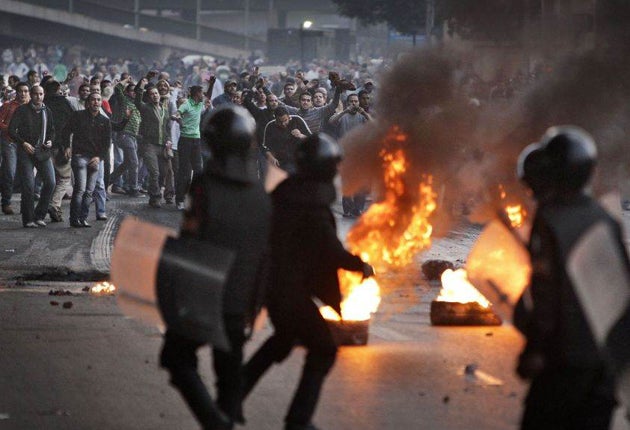Egyptian police arrest 1,000 in violent clashes

Your support helps us to tell the story
From reproductive rights to climate change to Big Tech, The Independent is on the ground when the story is developing. Whether it's investigating the financials of Elon Musk's pro-Trump PAC or producing our latest documentary, 'The A Word', which shines a light on the American women fighting for reproductive rights, we know how important it is to parse out the facts from the messaging.
At such a critical moment in US history, we need reporters on the ground. Your donation allows us to keep sending journalists to speak to both sides of the story.
The Independent is trusted by Americans across the entire political spectrum. And unlike many other quality news outlets, we choose not to lock Americans out of our reporting and analysis with paywalls. We believe quality journalism should be available to everyone, paid for by those who can afford it.
Your support makes all the difference.Egyptian officials last night confirmed two people had been killed in a fresh wave of anti-government protests in central Cairo.
Security sources said that a protester and a policeman died after being hit by a car during a clash in a poor neighbourhood. It brings the total number of people killed to six in two days of demonstrations against President Hosni Mubarak's 30-year regime.
News of the deaths came as the brother of political reform campaigner Mohamed ElBaradei confirmed he would return to Egypt on Thursday. ElBaradei is a vocal advocate of reform in Egyptian politics and a figurehead for many of the activists who organised the protests.
Egyptian police used tear gas, beatings and live ammunition fired into the air to quell those attempting to stage a repeat of the demonstrations that a day earlier brought tens of thousands of people on to the streets .
Nearly 1,000 people were arrested across Egypt yesterday as police mounted a coordinated crackdown using tear gas and beatings. The previous day up to 20,000 people joined marches across the nation that resulted in violent clashes, leaving a policeman and three protesters dead.
The authorities earlier declared a ban on any more protests in an effort to control an angry electorate, emboldened by street riots that sparked a revolt earlier this month in Tunisia. "All of Egypt must move, at one time," a Facebook group organising the demonstrations said yesterday, calling on Egyptians to come out for a second day of national protests. By the afternoon, access to Facebook along with Twitter appeared to be blocked.
The biggest demonstrations that Egypt has seen in more than three decades swept across the country on Tuesday in response to corruption, heavy-handed rule and deteriorating economic conditions. Inspired by the events in Tunisia that deposed President Zine al-Abidine Ben Ali after 23 years in power, thousands defied the wrath of the authorities to march.
Similar protests, although much smaller in scale, have rattled leaders across the Arab world, where authoritarian rulers have reigned with an iron fist for decades, feared for their often ruthless suppression of political expression.
In the town of Suez, where three protesters were killed on Tuesday, hundreds of demonstrators descended on the morgue, demanding the release of one of the bodies for autopsy amid claims that he had been killed by live fire. "The government has killed my son," the Suez protesters chanted. "Oh Habib, tell your master, your hands are soiled with our blood," they said, referring to Interior Minister Habib al-Adli.
Protesters in Cairo and elsewhere defied the government ban, with roughly 3,000 gathering outside a Cairo court before they were broken up by police using riot trucks. Outside the Journalists' Union, police used batons to beat protesters who attempted to breach their cordons, while others chanted: "Mubarak is leaving, leaving. Oh Egyptian people, be brave and join us."
Every time that demonstrations grew in size, they were charged by riot police with helmets and shields. By the evening, protesters were fighting back, throwing stones and burning tyres.
The emotive street scenes come as Mr Mubarak, 82, heads towards new presidential elections this autumn, where he is expected to stand for a sixth consecutive term.
In the past year, there have been isolated outbursts of anger against the regime, focused around police brutality, poverty, and rising food prices and unemployment, similar to the grievances that sparked riots in Tunisia. In November, parliamentary elections were widely denounced as fraudulent.
Many have directed their anger at Mr Mubarak, who has held power in Egypt since 1981.
Join our commenting forum
Join thought-provoking conversations, follow other Independent readers and see their replies
Comments